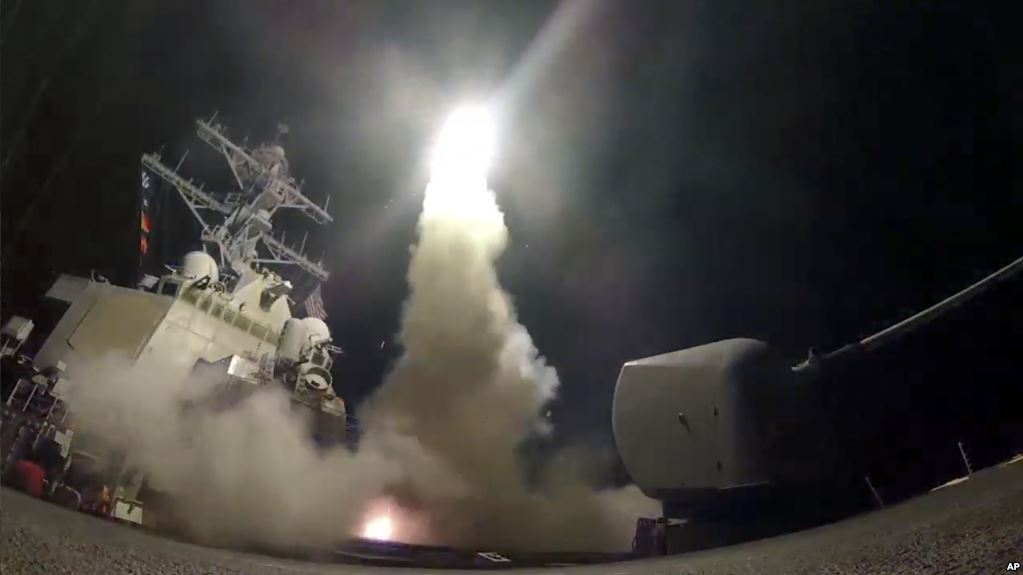Mohammad Reza Farhadi, a political commentator at Basirat Politcal Centre, believes that the US recent missile attack on a Syrian airbase was in line with Washington’s second strategy, i.e. escalating tensions and launching a war of attrition. The existence of a crisis in Syria means anti-US players such as Iran and Russia will get involved in the crisis.
Here are excerpts from his Farsi article:
US Used Chemical Attack Scenario as Excuse for Strike
The US launched a missile strike on an airbase in the Syrian province of Homs under the pretext that Damascus carried out a chemical attack in Idlib province. Speaking about the attack, US President Donald Trump said he ordered a limited military strike on the airbase from where the chemical attack had been conducted. He said preventing the spread and use of chemical arms would be in line with America’s national interests. This came as US allies such as Saudi Arabia, Britain, France and Israel supported the attack while Iran and Russia condemned it and dismissed the strike as blatant violation of a country’s sovereignty.
The US had been seeking an excuse to intervene in Syria, and finally the Idlib chemical arms incident provoked the White House to conduct the attack. Now the question is what Washington’s policies toward Syria are, and one should examine what the objective behind the recent missile attack was.
US Schemes for Syria
To achieve its ends, Washington has been nursing three major ambitions since the beginning of the Syria crisis:
- The ouster of Syrian President Bashar Assad: Since the Syria conflict began, the West has always stressed the necessity of Assad’s removal. The US authorities believe as long as Assad is in power, the situation of Syria will not change that much and the situation in the country will be the same as it was before 2011, and the only difference would be that there will be more inclination toward resistance. Former Saudi intelligence chief Bandar bin Sultan once said, “We seek to topple Assad, even if the price for that is to destroy the entire Syria.”
The key reason behind the West’s animosity toward Assad is that Syria is an ally of Iran and the Lebanese Hezbollah movement. Nevertheless, there are other reasons behind the West’s enmity.
Robert F. Kennedy, an American lawyer and the nephew of former US President John F. Kennedy, says Washington decided to remove Assad from power after he did not support a gas pipeline project belonging to the Qatari government. According to him, the $10-billion plan was first proposed in 2000, and the CIA followed up the issue. Nine years later, he writes, Assad announced he would not back the project that would have given Qatar direct access to Europe’s energy markets through Turkey’s terminals. The pipeline would have also enabled Riyadh to exert more influence on Iran in the region, writes Kennedy. So, Assad is known as a person who supports resistance and opposes the Western-Arab axis. The West is seeking a model similar to Egypt for Syria and wants somebody allied with the West with nationalistic and anti-Islam tendencies to come to power in Syria.
- Escalation of the conflict and mounting a war of attrition in Syria: After Washington failed to achieve its first goal, it opted to launch a massive attack on the Syrian government through different terror groups and with the support of the Middle East’s Arab countries such as Saudi Arabia and Qatar. Around 80 thousand terrorists from 96 countries are involved in the Syria war.
Now the key question is why the US is seeking to wage a war of attrition in Syria. The reason is that, first of all, the White House wouldn’t like the war to end at this point in time and does not want any of the players engaged in the Syria war to enjoy a relative balance of power or to emerge victorious. Secondly, the West seeks to wipe out Syria’s economic infrastructure. Before the Syria conflict began, there were nearly 3,000 factories in Idlib province, most of which either were destroyed or stopped operation. If Syria weren’t gripped by conflict, Idlib province might have been recognized as the economic hub of the area which covers the span of land once known as the Levant.
- The disintegration of Syria: The United States’ third strategy is to disintegrate Syria. Kissinger has put forward a proposal on that. He says Syria should be divided into three parts: one should be run by Bashar Assad, one by Sunnis and the other by Kurds in the North. He says loud and clear that this northern section is Washington’s key program and that the US can give Kurds in the north independence and, in return, use military airbases in northern Syria and expand its sphere of influence.
Final Analysis
The US missile strike on Syria is simply a response to Syria’s alleged chemical attack in Idlib. The US has come to understand that it is just a marginal player in the Syria crisis. In order to turn into the superior hegemon in Syria on the one hand, and further align its allies on the other, Washington seeks alternative solutions such as short attacks. On the other hand, the recent strike could be regarded as a US tactic to set the stage for the creation of a safe zone in Syria, one which Trump has been seeking since he took office as president.
